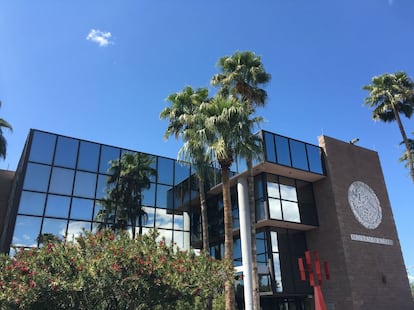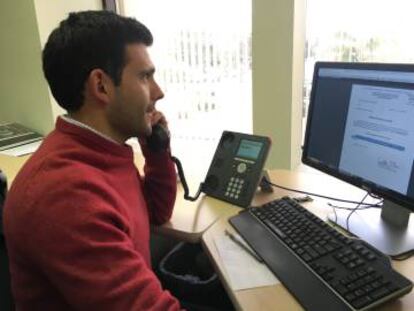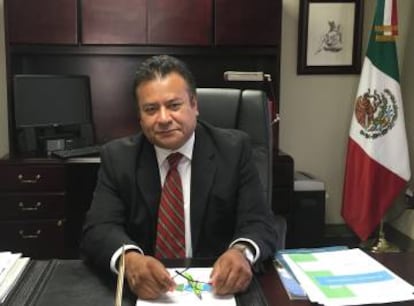The call center that helps locate missing Mexican migrants
Arizona-based information center in Tucson consulate deals with 100,000 inquiries a year


At 9.47am on March 3, the Mexican consulate in Tucson, Arizona received a call from a man who was lost in the desert after entering the state illegally from Mexico and who had not eaten or drunk anything for two days. The consulate first called the US Border Patrol, and then migrant centers in Nogales, on the US side of the border, to try to find out who the man was. At the same time, officials told the man to call 911 so as to locate his phone. Two hours later a Border Patrol helicopter rescued him.
The Mexican consulate’s Information and Assistance Center for Mexicans (CIAM) in Tucson receives around 700 to 800 calls a day to its freephone number, 70% of them from people trying to locate somebody who has crossed from Mexico into the United States illegally.
At 12.44pm one morning last week, a typical call came into the center.
“Where did he cross over?” asked the operator, adding: “Where was he coming from?”
Over the course of 2015 around 92,500 people called the CIAM, and in the first two months of this year it has received 13,000 calls
The first thing operators do in helping somebody find a missing person is to consult US prison, sheriff, and court databases, which can be done in seconds while the caller waits on the other end of the line.
The missing man has been arrested and is being held by a court in Laredo, Texas. It turns out he has agreed to testify against the coyote, or people smuggler, who brought him over. He will be deported, but no ban will be placed on him applying to migrate legally to the United States. The operator tells the person on the other end of the phone that they will have to supply proof they are a family member: “You could be the coyote trying to find out where this person is,” he says.

The CIAM received 26,300 calls during its first six months of operation, in 2013. Over the course of 2015 around 92,500 people called it, and in the first two months of this year it has received 13,000 calls. Some 40 people working eight-hour shifts staff the telephones.
Operators are trained not only to provide information, but also to understand the problems the people calling them face: they visit border areas, attend border patrol courses, and visit detention centers and soup kitchens in Mexico. “Sometimes the person we’re talking to has lost a loved one, and sometimes it’s the coyote,” says one operator.
At another desk, a female operator carefully spells out the address of a prison in Florence, Arizona for a man calling from the Mexican state of Guerrero who needs to send money to his wife, who has been held there since she was caught crossing in March. “We’ll tell him how to contact her. Prisoners are not told when money has arrived for them, so the sender must also write to the recipient,” she says, adding that the center receives around 30 calls a day from people being held in prison asking for a message to be sent to their family in Mexico.

“The hardest part of the job is when we can’t find somebody who has crossed over or we can’t give information out to somebody who is going out of their mind on the other end of the line,” says Gabriela Rodríguez, a line manager at the center. In 2013, the CIAM received 85 calls about people who were lost in the desert and were able to locate and rescue. Consulate personnel also regularly visit the local morgue to identify bodies found in the desert. On average around two cadavers are brought in every week, although in 2010, a total of 223 bodies were found.
The CIAM started out as a call center set up in 2010 in the wake of the Arizona state legislature’s approval of SB1070, a law that allowed police to stop and search people on the basis of their skin color. Since then it has become the center of Mexico’s nationwide network of consulates. In February this year it moved into new offices.
“We’ve adapted to changing times,” says Pineda, explaining that his team started out explaining Arizona’s legislation and has expanded to provide information about laws passed by the Obama administration to protect migrants against deportation. “Obviously, the upcoming US presidential campaign is worrying a lot of people. We tell them that nothing has changed yet.”
Sign up for our newsletter!
EL PAÍS English Edition is launching a weekly newsletter. Sign up today to receive a selection of our best stories in your inbox every Saturday morning. For full details about how to subscribe, click here.
English version by Nick Lyne.
Tu suscripción se está usando en otro dispositivo
¿Quieres añadir otro usuario a tu suscripción?
Si continúas leyendo en este dispositivo, no se podrá leer en el otro.
FlechaTu suscripción se está usando en otro dispositivo y solo puedes acceder a EL PAÍS desde un dispositivo a la vez.
Si quieres compartir tu cuenta, cambia tu suscripción a la modalidad Premium, así podrás añadir otro usuario. Cada uno accederá con su propia cuenta de email, lo que os permitirá personalizar vuestra experiencia en EL PAÍS.
¿Tienes una suscripción de empresa? Accede aquí para contratar más cuentas.
En el caso de no saber quién está usando tu cuenta, te recomendamos cambiar tu contraseña aquí.
Si decides continuar compartiendo tu cuenta, este mensaje se mostrará en tu dispositivo y en el de la otra persona que está usando tu cuenta de forma indefinida, afectando a tu experiencia de lectura. Puedes consultar aquí los términos y condiciones de la suscripción digital.








































